Applied Autonomous Sensor Systems - KK-stiftelsen
Applied Autonomous Sensor Systems - KK-stiftelsen
Applied Autonomous Sensor Systems - KK-stiftelsen
You also want an ePaper? Increase the reach of your titles
YUMPU automatically turns print PDFs into web optimized ePapers that Google loves.
<strong>Applied</strong> <strong>Autonomous</strong> <strong>Sensor</strong> <strong>Systems</strong><br />
1 Executive summary<br />
AASS (<strong>Applied</strong> <strong>Autonomous</strong> <strong>Sensor</strong> <strong>Systems</strong>) is a research profile at<br />
Örebro University. The profile has received 36 MSEK in funding from the<br />
Knowledge Foundation for the period 2002 to 2008. The purpose of the<br />
profile has been to build a qualitative, long-term research environment of a<br />
high international standard.<br />
FBA has been commissioned to carry out the final evaluation of the<br />
AASS profile. The evaluation is based on document studies and interviews<br />
with the management, researchers and graduate students at the profile as<br />
well as with representatives from the cooperating companies. The<br />
evaluation has also included a workshop-based mapping of the profile’s<br />
development process, a self-evaluation performed by the profile’s<br />
management and a peer review with experts from Lisbon Technical<br />
University, Portugal, R U Robots Limited, UK, and the University College<br />
of Skövde.<br />
The purpose of the evaluation is threefold. To verify that the activities<br />
have been carried out as stated in the agreement between the profile<br />
management and the Knowledge Foundation. To analyse the profile’s result<br />
and the working process that led to it. To give feedback on experiences,<br />
both to the profile and the Knowledge Foundation in order to contribute to<br />
the understanding of opportunities and limitations in developing a strong<br />
and co-producing research environment.<br />
The research profile has involved the entire AASS research environment,<br />
with its previously four, now three, research labs: Mobile robotics lab<br />
(MRL), Intelligent control lab (ICL), Learning systems lab (LSL) and<br />
Biologically inspired systems lab (BIS, which was merged with LSL in<br />
2007). A management board has conducted management and strategy work<br />
with the aid of a reference group comprising representatives from industry<br />
and national and international research communities.<br />
The aim of AASS was to develop academic excellence and a<br />
commercially relevant research environment within the ‘<strong>Applied</strong><br />
autonomous systems’ research field. It was also important to create<br />
prerequisites for the research environment to be strengthened and to<br />
continue beyond completion of the financed six-year period.<br />
These overarching goals were specified in a set of objectives. For the<br />
university, these were:<br />
• to achieve a leading role in the strategic research profile Human senses,<br />
autonomous sensor systems and industrial processes<br />
• to be a strong and well known partner, familiar to national and<br />
international research communities<br />
• to provide significant long-term contributions to undergraduate<br />
education.<br />
7


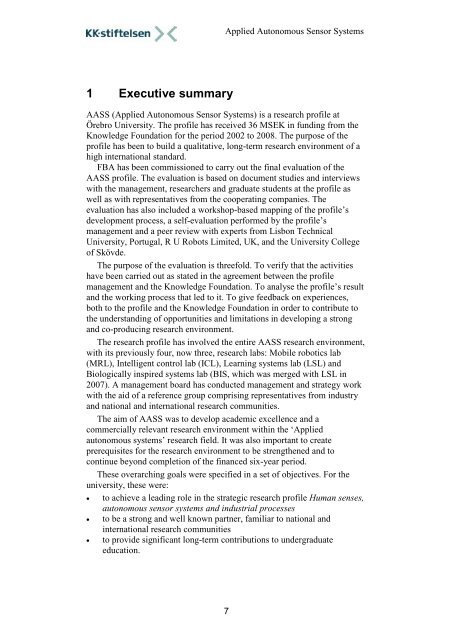
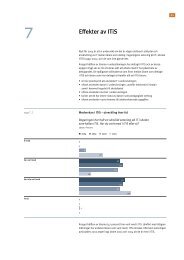
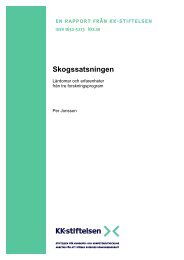
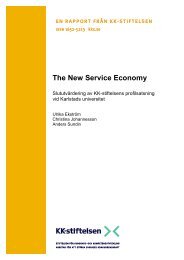
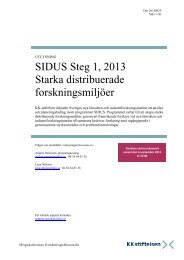
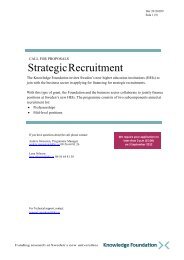
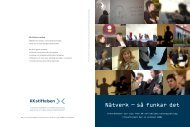
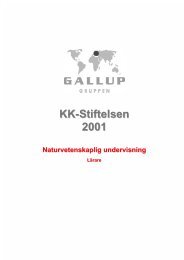

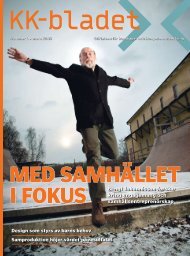

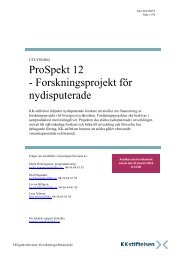

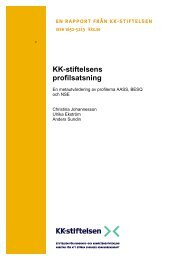
![[Klicka här och skriv titel] - KK-stiftelsen](https://img.yumpu.com/23861299/1/184x260/klicka-har-och-skriv-titel-kk-stiftelsen.jpg?quality=85)